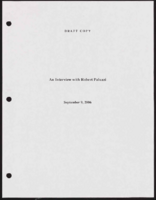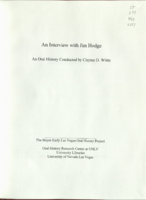Search the Special Collections and Archives Portal
Search Results

Transcript of interview with Roger Thomas by Stefani Evans and Claytee D. White, August 31, 2016
Date
Archival Collection
Description
As he reveals in this oral history, Roger Thomas is, among many other things, a son, a father, a brother, a husband, a student, an artist, a visionary, and a philanthropist. As the second son of Peggy and E. Parry Thomas’s five children, Roger was raised a Mormon child of privilege and civic responsibility. The banking family summered in Newport Beach, wintered in Sun Valley, and taught their children by words and deeds that it is not up for debate if you will be involved in your community; the only question is how you will apply your talents and resources to benefit your community. Roger absorbed the lessons well. As a child who struggled in school but excelled in art, he attended his last two years of high school at Interlochen Arts Academy, graduating in 1969, finally finding himself “in an environment where what I did had currency.” From there he earned his BFA from the School of the Museum of Fine Arts Boston and Studio Degree from Tufts University before returning to Las Vegas and eventually joining Steve Wynn’s team in 1981. As Executive Vice President of Design for Wynn Design & Development, he is the man in whom Steve Wynn places his trust to make real at each Wynn property the Wynn design philosophy: aim for a constituency of highly sophisticated, well-traveled, very educated people and give them a reality, a now, that is so fetching, so alluring they wish to be no place else. As he was mentored by his father and Steve Wynn, he too is mentoring those who will follow him. At Wynn, the next generation will carry forward the Wynn idea of evoca-texture, of creating “moments of experiential emotion that result in a memory so captivating and so unique that if you want to repeat that you have to come back.” At home, he collaborates with his daughter on a children’s book that has the potential to become a series; she is the illustrator, while he provides the words. Roger Thomas sat for this interview five days after his father, E. Parry Thomas, passed away in Idaho. Instead of postponing the interview to a more convenient time, Roger kept the appointment and explained, “This is for UNLV. If I’d cancelled my father would have killed me.”
Text

Ray D. Merrill interview, March 14, 1978: transcript
Date
Archival Collection
Description
On March 14, 1978, collector Rick Merrill interviewed his father Ray Merrill (born May 22nd, 1933 in Wynona, Oklahoma) about living in Southern Nevada. In this interview, Mr. Merrill speaks extensively about working while growing up in Las Vegas, Nevada. From eleven years old on, he worked as a paperboy, shoe shiner, and grocery store clerk, among other jobs. He also talks about being a student at Las Vegas High School and what he and others did for recreation. The discussion also includes the history of hospitals in Las Vegas as well as what doctors’ offices were like.
Text

Transcript of interview with Robert Paluzzi by Claytee White, September 5, 2006
Date
Archival Collection
Description
Claytee White interviews Robert Paluzzi on September 5, 2006.
Text

Paul Sogan interview, May 16, 1995: transcript
Date
Archival Collection
Description
Interviewer: Dennis McBride
Text

Transcript of interview with Nora Luna by Maribel Estrada Calderón, November 7, 2018
Date
Archival Collection
Description
Nora Luna (1971 - ), the daughter of Mexican immigrants, recalls her growing up experience in the Las Vegas Valley. During her childhood, she and her siblings frequently persuaded their father to take them out to eat to the Circus Circus buffet. She enjoyed playing the carnival games at the Circus Circus. She attended Las Vegas High School. In 1994, she graduated from UNLV with a degree in criminal justice. Her education inspired her to work with the community’s youth. She tutored children at the Y.M.C.A. of Southern Nevada. Luna also worked for a program, Anahuac, which sought to deconstruct some of the myths that often prevent Latinos from attending college. In Reno, Nevada she worked with non-profit organizations to implement evidence-based practices for youth development. Luna has worked for Nathan Adelson Hospice as the Director of Diversity and Grant Funding since 2008. She seeks to find culturally competent care for Latinos and ensures that the hospice provides informational r
Text

Jocelyn Cortez interview, March 18, 2019: transcript
Date
Archival Collection
Description
Interviewed by Nathalie Martinez. Jocelyn Cortez is a Salvadoran-American immigration lawyer. She grew up on the Eastside of Las Vegas and grew up going to school in the Clark County School District and at UNLV before going to Law School at the University of Arizona. She is an engaged community member as an immigration lawyer working alongside the Culinary Union and the Latino Bar Association.
Text

Transcript of interview with Joanne Imprescia by David Furbush, March 20, 1978
Date
Archival Collection
Description
On March 20, 1978, David Furbush interviewed Joanne Imprescia (born October 10th, 1927 in Keokek, Iowa) about her life as a hairdresser in Las Vegas, Nevada. Imprescia discusses the growth of Las Vegas and the local social climate of the fifties. The interview concludes with Imprescia explaining her experiences as a Las Vegas business owner and the hairdressing industry in Southern Nevada.
Text

Transcript of interview with Marshall Mack Dawson by Robert Maichle, November 1, 1979
Date
Archival Collection
Description
On November 1, 1979, Robert Maichle interviewed Marshall Mack Dawson (born 1938 in Las Vegas, Nevada) about his experiences living in Las Vegas. Dawson first talks about his early education, his family, and the Old Las Vegas Mormon Fort. He then describes the changes he has noticed over time, the atomic testing, the Helldorado parades, Red Rock, the development of the Strip, and the changes in the Downtown area. Dawson also discusses some of his work for Nevada Power, the early movie theaters, his opinions on journalism, and various other topics.
Text

Transcript of interview with Jack Cornell by Richard Fesler, February 18, 1979
Date
Archival Collection
Description
On February 18, 1979, Richard Fesler interviewed Jack W. Cornell (born 1918 in Manhattan, Nevada) about his experiences living in Nevada. The two first discuss historical buildings, including the Nye County Courthouse, and Cornell describes his family background and the different locations at which his ancestors lived. Cornell then talks about his experiences as an airplane mechanic for the Army Air Corps during World War II and the different countries he would visit during that time. The two also discuss the effects of the Depression, Cornell’s work in automotive body repair, and his recreational activities. Cornell also describes an experience in which he assisted an air escort for President Roosevelt, and he also describes when he witnessed one of the atomic tests. The interview concludes with Cornell’s thoughts on how the rural area in Manhattan has changed over time.
Text

Transcript of interview with Jim Hodge by Claytee White, April 13, 2009
Date
Archival Collection
Description
Jim Hodge describes an active and success filled life in this narrative. Born and raised in the South, Jim enlisted in the Navy at the young age of 17, just as World War II was winding down. His primary job was that of a cook. He became smitten with the life of an entertainer after participating in a play and headed for Hollywood in 1952. It was there that he auditioned for Donn Arden, who organized and directed Las Vegas shows. Though he didn't get the part, he did get hired to be a singer for a show featuring Betty Grable. Thus his career was launched and would span the heyday of Las Vegas entertainment from the 1950s to the 1970s. Jim talks about the people, shows and places that touched his life. He also offers thoughts about the changes in the Vegas entertainment scene as well as shares his relationship with his church over the past 40 years.
Text
